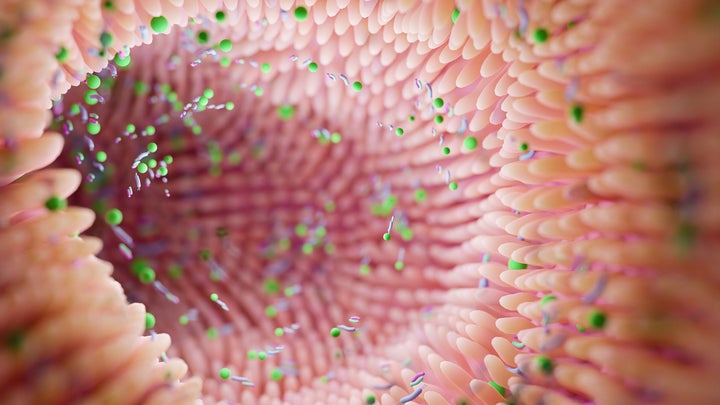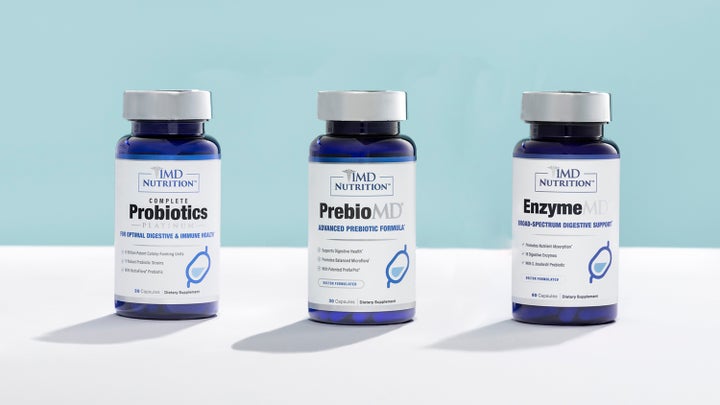High-quality sleep is a foundational aspect of health and directly affects the functioning of the digestive tract. These two components are interrelated, and the quality of your sleep will affect the health of your gut microbiota. Your gut microbes contribute to your sleep patterns and play an important role in maintaining the circadian rhythm and fluctuations between sleep cycles.
What Are the Different Stages of Sleep?
There are five stages of sleep that we cycle in and out of throughout the night. In a healthy sleep period, we will visit and revisit the different stages of the cycle at different periods of sleep. The first and second stages are light sleep, which is when we transition from wakefulness to the deeper stages of the sleep cycle. In these first two stages, the body relaxes, the brain waves begin to lengthen, and the heart and breathing rates slow as the body prepares for deep sleep.
The deep sleep cycle is a stage where digestive processes slow and the body performs many restorative functions. This is an incredibly important stage of sleep where the body is able to focus on the tissue’s normal process of growth and regeneration, such as the routine regenerative process of cells along the gut wall and the upkeep of the many organs within the digestive system.
Without enough time in the deep sleep stage, the body misses out on this important opportunity to perform everyday maintenance activities throughout the digestive tract. Every stage of sleep is essential to overall health, but these specific deep sleep activities help to keep the digestive tract maintained in ways that greatly support the digestive organs and the health of the microbiome.
As we enter REM sleep (the dream stage), some digestive functions return to their regular rhythm of contraction and absorption. Upon waking, which is the last stage of the sleep cycle, the digestive system moves back into action with high-amplitude colonic contractions that help sweep food residue through the bowel and prepare the colon for evacuation. These high-amplitude contractions assist with bowel regularity and are incredibly important in preparing the body for the digestive function of the wake cycle.

What Is the Relationship Between Deep Sleep and Gut Health?
Because the digestive tract is so complex, there are many aspects that can be affected by sleep or lack thereof. While we are in the stage of deep sleep, digestion slows down, and gastric emptying, peristalsis, and the migrating motor complex (the forces that move food through the digestive tract) are largely halted. This allows the digestive system to switch out of assimilation mode and into more regenerative activities.
Specific cells called lymphocytes help maintain the health of the gut barrier, and they rely on circadian rhythm signals to carry out their functions. A healthy sleep cycle ensures that these important cells are able to support the normal functions along the walls of the digestive tract and promote a healthy microbiome environment.
The gut-brain axis is deeply connected to sleep patterns and everyday stress levels. When the brain perceives common stressors, the body shifts into the “fight or flight” state of the nervous system, which affects how the digestive system functions. When we don’t get plenty of sleep, the “fight or flight” response becomes more sensitive, and digestive system behavior is altered.
By supporting the opposite response in the body and engaging the “rest and digest” state, we contribute to feeling relaxed and promote good quality sleep. This should benefit the efficiency of the digestive system, supporting regularity and digestive capacity. One of the best ways to ensure you are able to respond well to everyday stressors is by getting plenty of deep sleep. This type of sleep is most effective at promoting calm and reducing daily stress levels by helping to regulate the emotional processing centers in the brain.
Another important relationship between sleep and the digestive system involves the gut microbiome, the complex microecology that resides inside the bowel. There is a bidirectional relationship between gut microbes and sleep. There is evidence that shows that the quality of sleep we get affects the health of our gut microbes, and the presence of certain microbes can, in turn, affect our quality of sleep. It is proposed that altering the microbe populations in the gut can be a pathway to promote healthy sleep cycles. Although adding in healthy microbes may benefit sleep, it is incredibly important to take a comprehensive approach and implement lifestyle changes that will encourage good quality sleep.
How to Promote Deep Sleep for Gut Health
A consistent sleep routine helps send the body signals to start shifting into a mode of relaxation. Your daily activities, the foods you eat, and even your screen time habits can all contribute to a healthy circadian rhythm cycle.

Here are a few do’s and don'ts for good sleep hygiene.
♦ Do have a consistent sleep routine/sleep schedule. Waking and going to bed at the same time each day helps keep your circadian rhythms consistent.
♦ Don’t get too much blue light exposure before bed. Blue light emitted from digital devices such as computers and smartphones may affect the secretion of melatonin and interfere with your wake and sleep cycles.
♦ Do exercise or participate in other healthy movement activities. Exercise may be an effective tool for affecting the diversity of your gut flora and can contribute to healthy sleep quality.
♦ Don’t drink caffeine late in the day. Although you may not notice caffeine consumption affecting your sleep, it has been linked to less optimal sleep quality.
♦ Do keep your naps short or avoid them altogether. A short power nap early in the day can help to promote alertness and productivity, but longer naps may interfere with nighttime sleep cycles.
♦ Don’t eat heavy meals right before bedtime. A big meal or rich foods may make it harder for your body and mind to fall asleep. Stick to small snacks that may promote healthy sleep, such as cherries, bananas, almonds, and walnuts.
♦ Do eat nutritious foods and take your vitamins as certain nutrients can promote better sleep.
♦ Don’t drink too much alcohol. Alcohol can change the amount of time you spend in different stages of sleep and may significantly impact the quality of your sleep.
♦ Do take prebiotics, specifically galacto-oligosaccharides, which are found in PrebioMD®.
♦ Do take probiotics, specifically Bifidobacterium longum, Lactobacillus plantarum, Lactobacillus casei, Lactobacillus gasseri, and Lactobacillus rhamnosus, which are included in the scientifically-formulated Complete Probiotics Platinum®.
♦ Do meditate to induce the parasympathetic state and relax your nervous system. Even 5-10 minutes before bed is effective.
♦ Do drink herbal teas before bedtime, such as chamomile, catnip, or lemon balm. This can have relaxing effects and may also benefit gut health.
How to Support Gut Health From Within
The gut is a complex place, so it is sometimes necessary to take a multifaceted approach if you are looking to promote long-term health. Supplements are a great addition to a gut-healthy lifestyle, and there are specific combinations available that are a good starting point for helping to maintain a healthy gut microbiome.

Probiotics
We created the broad spectrum formula Complete Probiotics Platinum® so you can support microbiome diversity for optimal digestive and overall health. This formula contains 11 scientifically-studied bacterial strains, including Lactobacillus plantarum and Lactobacillus rhamnosus, which produce gamma-amino butyric acid (GABA). This neurotransmitter has a relaxing effect on the central nervous system.
Prebiotics
Prebiotics are special fibers that nourish the good bacteria in the gut. I formulated the advanced prebiotic formula PrebioMD® to help assist the balance of healthy microorganisms in the digestive system. It has been found that prebiotics, specifically galactooligosaccharides, may contribute to more time in deep sleep due to the special metabolites emitted from the microbes which feed on these kinds of fibers.
Digestive Enzymes
Enzymes are special proteins that help break down food into absorbable substances. Drawing on my research in nutrient assimilation, I formulated EnzymeMD® to assist in the digestion of protein, carbohydrates, fats, and plant fibers so that these components can be fully absorbed and your microbiome can stay balanced with healthy bacteria levels.
Final Thoughts
My research on probiotics and nutrient assimilation has laid the foundation for my partnership with 1MD Nutrition®, and together we have developed a collection of supplements designed to support digestion as well as help to maintain a healthy gut microbiome. As the health of this complex system relates directly to many aspects of physical and mental health, it should be a priority for anyone seeking to maintain long-term wellness. By promoting high-quality sleep, specifically deep sleep, and a healthy diet and lifestyle, digestive wellness can be within your reach, along with sustained physical and mental health.
Dr. David Kahana
![]()
Dr. David Kahana is board certified in Pediatrics and Gastroenterology through the American Board of Pediatrics (ABP), as well as Medical Nutrition through the National Board of Physician Nutrition Specialists.








